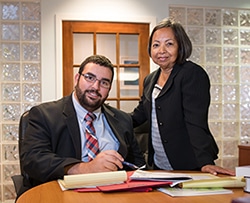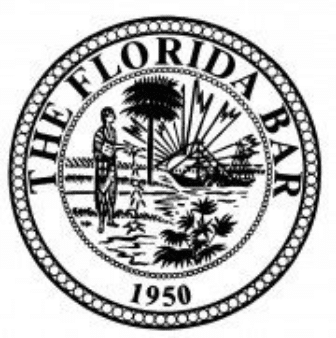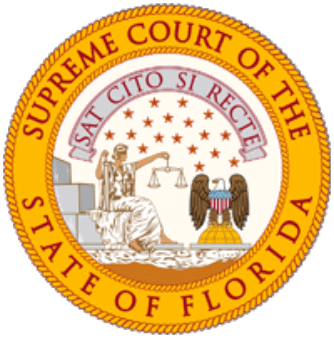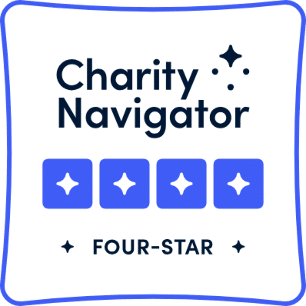After scouring the internet for legal help and finding the cost of a bankruptcy lawyer overwhelming, an elderly couple approached Community Legal Services of Mid-Florida (CLSMF).
What might have seemed like an everyday occurrence at a legal aid program would become enlightening for law student Jonathan Levy. He and his mentor, lawyer Jesusa Panton, listened as their new pro bono clients, the elderly couple, grew concerned about how they would travel to work if they had to surrender their car after filing for bankruptcy. Levy observed Panton as she counseled the clients about alternatives.
“It made me realize, I’m going to law school to deal with legal issues,” Levy said. “But you have real people and your legal actions have real consequences. It’s not just legal.”

Levy had the opportunity to work on the case through the Florida Pro Bono Law School Challenge, a pilot program created by the Foundation’s pro bono department this spring.
Using an online platform to match students with alumni mentors, Florida’s law schools competed to see whose students and alumni could take the most pro bono cases during the spring semester. During the four months of the challenge, students and lawyers from all of Florida’s 12 law schools worked on 306 unique cases.
“I honestly didn’t know if I would get the pleasure of meeting with clients,” Levy said. “I thought I’d just get some legal research to do.”
Instead, Levy, a rising 3L at the Dwayne O. Andreas School of Law at Barry University, spent several weeks working on the case with the clients and shadowing Panton, a Barry Law alumna.
Panton encouraged him to ask their clients questions, let him fill out their bankruptcy worksheet and asked him to obtain the required financial documents to start the bankruptcy petition.
“We had a situation where we needed some pay stubs, so it was my responsibility to reach out to the employer and get them so we could move along. Little tasks like that come together and form the case,” Levy said. “That was cool because these are things you don’t think of because you’re not really exposed to the practical side in law school.”
One of the ways the Foundation accomplishes its mission to increase access to justice is by promoting public service among lawyers by making it an integral component of the law school experience. The Florida Pro Bono Law School Challenge facilitated both representation of low-income persons and promotion of public service.
According to the ABA Center for Pro Bono, more than 58% of lawyers who provided pro bono legal services as law students said doing so made them “more” or “far more” likely to provide pro bono services after graduating.
Levy, whose father is a bankruptcy attorney in Fort Myers, understood the basics of a Chapter 7 bankruptcy, but felt he learned much more by having a hands-on experience.
“Mentoring provides an opportunity to help law school students to do better by making them experience real practice,” Panton, a solo practitioner in Leesburg, said. “I truly enjoyed the opportunity to mentor a future attorney.”
Having found mentoring to be a rewarding experience before, Panton jumped at the chance to help her alma mater, mentor again, and take a pro bono case at the same time.
Working alongside Panton, Levy was also exposed to challenges and learned how to overcome them.
“[Our clients] were Spanish-speaking. We had to use a translator provided by CLSMF, so one of the things I learned is what you do when you’re faced with a language barrier,” Levy said.
Levy also learned how Panton is able to incorporate pro bono into her law career. “I think pro bono is a really important part of what being a member of any bar stands for,” Levy said. “I think that the partnership Jesusa has with legal aid, taking pro bono cases as she’s able, that seems like a really good way to integrate it into a private practice.”
Panton has also volunteered as a guardian ad litem.
“Pro bono means giving back to the community,” said Panton. “As a lawyer, I have chosen to be a public servant. It is a privilege to be of service to those who need it.”
Panton and Levy finished their pro bono case with a hearing as Levy was taking his final exams. Sixty days later, the clients received a discharge order, which was a positive outcome for them.
Panton and Levy’s partnership earned their school, Barry Law, points for student and alumni engagement during the challenge.
The Foundation announced the winners of the challenge at The Florida Bar Annual Convention in June. Florida Coastal School of Law won the top honor, the MVP Pro Bono Champion Award, for matching the most students with its own alumni. Florida A&M University College of Law won for the most alumni engagement; Barry University School of Law won for most student engagement.
“The number of cases taken exceeded our expectations,” Juliette E. Lippman, immediate past president of the Foundation, said. “We are so impressed with the interest and commitment of the students, and the dedication of the lawyers who took these cases.”
In December 2023, The Florida Bar Foundation changed its name to FFLA. Posts prior to this date contain our former name.




